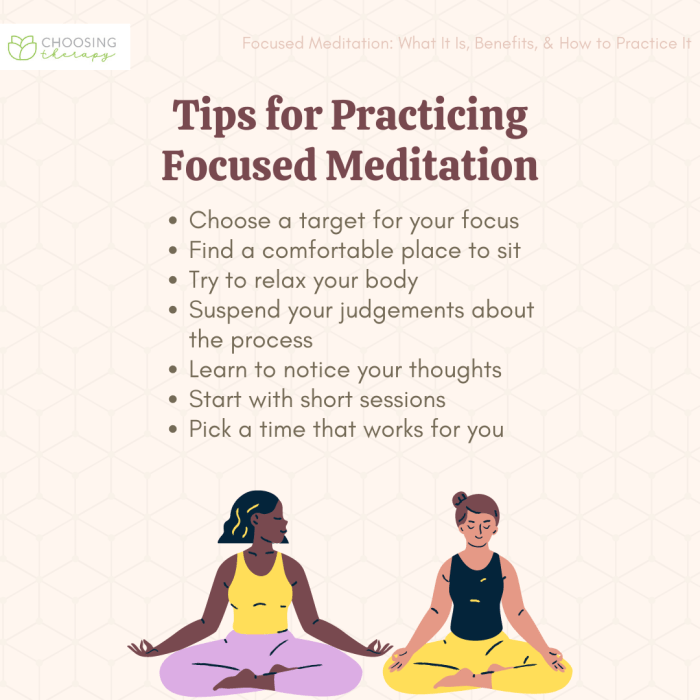5 Ways to Improve Focus Through Meditation sets the stage for this enthralling narrative, offering readers a glimpse into a story that is rich in detail with motivational lecture style and brimming with originality from the outset.
Meditation is a powerful tool that can significantly enhance your focus and concentration. By incorporating specific techniques into your daily routine, you can rewire your brain for better attention control. Let’s explore the 5 key ways to improve your focus through meditation.
Benefits of Meditation for Improving Focus: 5 Ways To Improve Focus Through Meditation

Meditation has been known for its ability to enhance focus and concentration through various techniques that help calm the mind and increase awareness. By practicing meditation regularly, individuals can experience a range of benefits that positively impact their ability to stay focused and attentive.
Enhancing Concentration
Meditation techniques such as mindfulness meditation or focused attention meditation require individuals to concentrate on a specific object, thought, or breath. This practice helps train the mind to maintain focus and resist distractions, ultimately improving concentration levels over time.
Studies Demonstrating Positive Impact, 5 Ways to Improve Focus Through Meditation
Numerous studies have shown the positive impact of meditation on focus. For example, a study published in the journal Psychological Science found that participants who underwent an eight-week meditation program showed improved attention and focus compared to a control group. Another study published in the Journal of Cognitive Enhancement revealed that regular meditation practice can enhance cognitive control processes, including attention and focus.
Rewiring the Brain for Better Attention Control
Regular meditation practice has been linked to neuroplasticity, the brain’s ability to reorganize itself by forming new neural connections. Through meditation, individuals can strengthen neural pathways associated with attention control, leading to improved focus and cognitive function. This rewiring of the brain allows for better regulation of attention and reduced susceptibility to distractions in daily activities.
Types of Meditation Techniques for Focus

When it comes to improving focus through meditation, there are various techniques that can be particularly beneficial. Each technique offers unique benefits and approaches to enhancing concentration and attention.
Mindfulness Meditation
Mindfulness meditation involves focusing on the present moment without judgment. Practitioners are encouraged to observe their thoughts, emotions, and sensations as they arise, helping to cultivate awareness and concentration. This technique is widely recognized for its ability to improve focus and attention span.
Loving-Kindness Meditation
Loving-kindness meditation, also known as Metta meditation, involves directing feelings of love and compassion towards oneself and others. By practicing this technique, individuals can cultivate positive emotions and enhance their ability to stay present and focused. This can be particularly helpful in reducing distractions and improving concentration.
Body Scan Meditation
Body scan meditation involves systematically focusing on different parts of the body, from head to toe, and observing any sensations or tensions present. This technique can help individuals become more aware of their physical state and release any tension that may be hindering their focus. By promoting relaxation and bodily awareness, body scan meditation can enhance overall concentration.
Incorporating Meditation into Daily Routine

Integrating meditation into your daily routine can be a powerful way to enhance focus and productivity. Here are some tips on how to seamlessly include meditation in a busy schedule.
Best Times for Meditation
Choosing the right time to meditate can significantly impact the effectiveness of your practice. Mornings are often recommended as an ideal time to meditate, as it can help set a positive tone for the day ahead. Additionally, meditating in the morning allows you to start your day with a clear mind and improved focus. However, if mornings are too hectic, consider meditating during your lunch break or in the evening to unwind and refocus.
Short Meditation Sessions for Work Breaks
When you have a busy schedule, finding time for meditation during work breaks can be beneficial. Short meditation sessions can help reset your mind and increase your concentration levels. Here are some examples of quick meditation practices you can incorporate into your workday:
- 1. Deep Breathing: Take a few minutes to focus on your breath, inhaling deeply through your nose and exhaling slowly through your mouth. This can help calm your mind and improve focus.
- 2. Body Scan Meditation: Close your eyes and bring your attention to different parts of your body, starting from your toes and moving up to your head. This practice can help release tension and increase mindfulness.
- 3. Guided Visualization: Listen to a short guided meditation or visualization exercise that can help you relax and improve your mental clarity.
Creating a Calming Environment for Meditation

Creating a peaceful environment for meditation is crucial to achieving deep focus and relaxation. A calming space can help reduce distractions and promote a sense of tranquility, allowing you to fully engage in your meditation practice.
Setting Up a Calming Meditation Space
To set up a calming meditation space at home or in the workplace, consider the following tips:
- A designated area: Choose a quiet and clutter-free area where you can meditate without interruptions.
- Comfortable seating: Use a cushion or chair that supports good posture and allows you to sit comfortably for an extended period.
- Natural light: If possible, meditate in a space with natural light or use soft, dim lighting to create a relaxing atmosphere.
- Aromatherapy: Incorporate essential oils or incense with calming scents like lavender or sandalwood to enhance relaxation.
- Soothing sounds: Play soft music, nature sounds, or white noise to drown out background noise and promote a sense of calm.
Enhancing Focus Through Calming Elements
Incorporating elements like aromatherapy, soft lighting, and soothing sounds can help enhance focus during meditation by creating a serene and tranquil environment. These calming elements can reduce stress, anxiety, and distractions, allowing you to deepen your meditation practice and improve your overall well-being.
Mindfulness Practices Outside of Formal Meditation

Practicing mindfulness throughout the day can significantly improve focus and overall well-being. By incorporating mindfulness into daily activities, individuals can cultivate a sense of presence and awareness in their lives, leading to enhanced concentration and clarity.
Examples of Incorporating Mindfulness into Daily Activities
- While eating: Focus on the taste, texture, and smell of the food. Chew slowly and savor each bite, paying attention to your body’s hunger cues.
- While walking: Notice the sensations in your body as you move. Feel the ground beneath your feet, the air against your skin, and the sounds around you.
- While washing dishes: Engage fully in the task at hand. Feel the warm water on your hands, notice the soap bubbles, and the movements you make while washing each dish.
Tips for Staying Present and Focused Throughout the Day
- Acknowledge distractions without judgment: When distractions arise, simply notice them and gently bring your attention back to the present moment.
- Take short mindfulness breaks: Set aside a few minutes throughout the day to pause, breathe, and refocus your attention. This can help reset your mind and improve focus.
- Practice deep breathing: Incorporate deep breathing exercises into your daily routine to calm the mind and increase focus. Focus on the sensation of the breath entering and leaving your body.
Final Conclusion
In conclusion, mastering the art of meditation can unlock a world of improved focus and productivity. By integrating these techniques into your daily life, you can experience a profound transformation in your ability to concentrate and stay present. Embrace the power of meditation and elevate your focus to new heights.